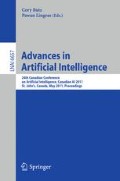Abstract
In this paper, we propose the use of semantic information for the task of answering complex questions. We use the Extended String Subsequence Kernel (ESSK) to perform similarity measures between sentences in a graph-based random walk framework where semantic information is incorporated by exploiting the word senses. Experimental results on the DUC benchmark datasets prove the effectiveness of our approach.
Access this chapter
Tax calculation will be finalised at checkout
Purchases are for personal use only
Preview
Unable to display preview. Download preview PDF.
References
Amigo, E., Gonzalo, J., Peinado, V., Peinado, A., Verdejo, F.: An Empirical Study of Information Synthesis Tasks. In: Proceedings of the 42nd Annual Meeting of the Association for Computational Linguistics, Barcelona, Spain, pp. 207–214 (2004)
Chali, Y., Joty, S.R.: Word Sense Disambiguation Using Lexical Cohesion. In: Proceedings of the 4th International Conference on Semantic Evaluations, pp. 476–479. ACL, Prague (2007)
Chali, Y., Hasan, S.A., Joty, S.R.: Improving Graph-based Random Walks for Complex Question Answering Using Syntactic, Shallow Semantic and Extended String Subsequence Kernels. Information Processing and Management (2010) (in Press, Corrected Proof), http://www.sciencedirect.com/science/article/B6VC8-51H5SB4-1/2/4f5355410ba21d61d3ad9f0ec881e740
Erkan, G., Radev, D.R.: LexRank: Graph-based Lexical Centrality as Salience in Text Summarization. Journal of Artificial Intelligence Research 22, 457–479 (2004)
Fellbaum, C.: WordNet - An Electronic Lexical Database. MIT Press, Cambridge (1998)
Harabagiu, S., Lacatusu, F., Hickl, A.: Answering complex questions with random walk models. In: Proceedings of the 29th Annual International ACM SIGIR Conference on Research and Development in Information Retrieval, pp. 220–227. ACM, New York (2006)
Hirao, T., Suzuki, J., Isozaki, H., Maeda, E.: Dependency-based Sentence Alignment for Multiple Document Summarization. In: Proceedings of COLING 2004, pp. 446–452. COLING, Geneva (2004)
Hirao, T., Suzuki, J., Isozaki, H., Maeda, E.: NTT’s Multiple Document Summarization System for DUC2003. In: Proceedings of the Document Understanding Conference (2003)
Lin, C.Y.: ROUGE: A Package for Automatic Evaluation of Summaries. In: Proceedings of Workshop on Text Summarization Branches Out, Post-Conference Workshop of Association for Computational Linguistics, Barcelona, Spain, pp. 74–81 (2004)
Mihalcea, R., Tarau, P.: TextRank: Bringing Order into Texts. In: Proceedings of the Conference of Empirical Methods in Natural Language Processing, Barcelona, Spain (2004)
Otterbacher, J., Erkan, G., Radev, D.R.: Using Random Walks for Question-focused Sentence Retrieval. In: Proceedings of Human Language Technology Conference and Conference on Empirical Methods in Natural Language Processing, Vancouver, Canada, pp. 915–922 (2005)
Sjöbergh, J.: Older Versions of the ROUGEeval Summarization Evaluation System Were Easier to Fool. Information Processing and Management 43, 1500–1505 (2007)
Author information
Authors and Affiliations
Editor information
Editors and Affiliations
Rights and permissions
Copyright information
© 2011 Springer-Verlag Berlin Heidelberg
About this paper
Cite this paper
Chali, Y., Hasan, S.A., Imam, K. (2011). Using Semantic Information to Answer Complex Questions. In: Butz, C., Lingras, P. (eds) Advances in Artificial Intelligence. Canadian AI 2011. Lecture Notes in Computer Science(), vol 6657. Springer, Berlin, Heidelberg. https://doi.org/10.1007/978-3-642-21043-3_9
Download citation
DOI: https://doi.org/10.1007/978-3-642-21043-3_9
Publisher Name: Springer, Berlin, Heidelberg
Print ISBN: 978-3-642-21042-6
Online ISBN: 978-3-642-21043-3
eBook Packages: Computer ScienceComputer Science (R0)

